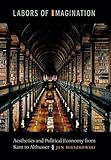Labors of Imagination : Aesthetics and Political Economy from Kant to Althusser / Jan Mieszkowski.
Material type: TextPublisher: New York, NY : Fordham University Press, [2022]Copyright date: ©2006Description: 1 online resource (240 p.)Content type:
TextPublisher: New York, NY : Fordham University Press, [2022]Copyright date: ©2006Description: 1 online resource (240 p.)Content type: - 9780823225873
- 9780823291984
- online - DeGruyter
| Item type | Current library | Call number | URL | Status | Notes | Barcode | |
|---|---|---|---|---|---|---|---|
 eBook
eBook
|
Biblioteca "Angelicum" Pont. Univ. S.Tommaso d'Aquino Nuvola online | online - DeGruyter (Browse shelf(Opens below)) | Online access | Not for loan (Accesso limitato) | Accesso per gli utenti autorizzati / Access for authorized users | (dgr)9780823291984 |
Frontmatter -- Contents -- Acknowledgments -- Preface -- Introduction: Production, History -- 1. The Art of Interest -- 2. Breaking the Laws of Language -- 3. On the Poetics and Politics of Voice -- 4. Economics Beyond Interest -- 5. Ideology, Obviously -- Conclusion -- Notes -- Bibliography -- Index
restricted access online access with authorization star
http://purl.org/coar/access_right/c_16ec
This book is a major new study of the doctrines of productivity and interest in Romanticism and classical political economy. The author argues that the widespread contemporary embrace of cultural historicism and the rejection of nineteenth-century conceptions of agency have hindered our study of aesthetics and politics. Focusing on the difficulty of coordinating paradigms of intellectual and material labor, Mieszkowski shows that the relationship between the imagination and practical reason is crucial to debates about language and ideology. From the Romantics to Poe and Kafka, writers who explore Kant's claim that poetry "sets the imagination free" discover that the representational and performative powers of language cannot be explained as the products of a self-governing dynamic, whether formal or material. A discourse that neither reflects nor prescribes the values of its society, literature proves to be a uniquely autonomous praxis because it undermines our reliance on the concept of interest as the foundation of self-expression or self-determination. Far from compromising its political significance, this turns literature into the condition of possibility of freedom. For Smith, Bentham, and Marx, the limits of self-rule as a model of agency prompt a similar rethinking of the relationship between language and politics. Their conception of a linguistic labor that informs material praxis is incompatible with the liberal ideal of individualism. In the final analysis, their work invites us to think about social conflicts not as clashes between competing interests, but as a struggle to distinguish human from linguistic imperatives.
Mode of access: Internet via World Wide Web.
In English.
Description based on online resource; title from PDF title page (publisher's Web site, viewed 03. Jan 2023)


